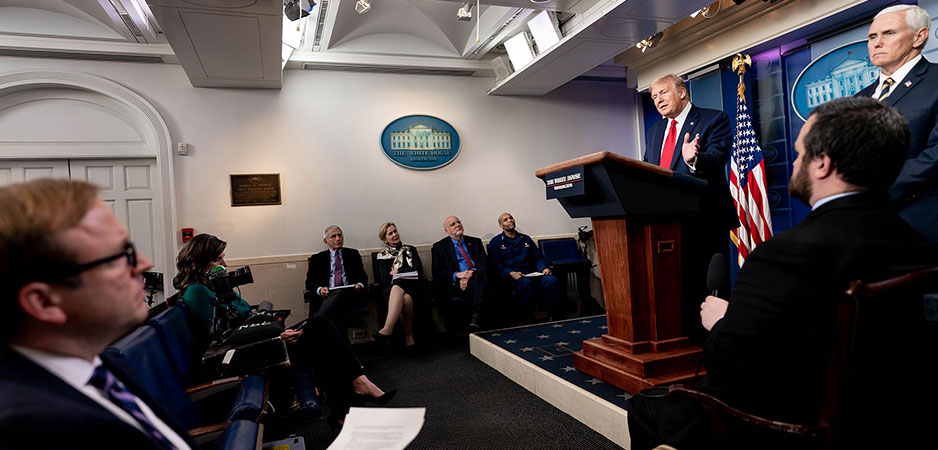Last week, on William Shakespeare’s 456th birthday, US President Donald Trump — presumably under the influence of James Joyce, whom The Donald undoubtedly remembers as the author of “Finnegan’s Woke” — let the stream of his semi-consciousness guide his thoughts along a meandering medicalized path traversed by rivers of ultraviolet light subcutaneously striving to bleach the Fisher King into wholeness, lost as the mythical leader was among a heap of broken images, facing the red sullen faces of the media that sneer and snarl. For Trump, April is indeed the cruelest month.
India’s Tactical Victory on HCQ Misses the Bigger Picture
Trump’s creative improvisation on injected bleach and intravenous sunlight momentarily had the unfortunate effect of casting a deep shadow over his presidency. The entire world — save the disciplined extras populating the stage, instructed not to smile or wince even at Trump’s most extreme samples of surreal comedy — reacted in horror and disbelief upon hearing their leader intone a script that might have been provided by Alfred Jarry, had he thought of writing a play with the title, “Ubu médecin (malgré lui).”
The following day, on April 24, informed by numerous voices that his spontaneous riff on cures for the novel coronavirus known as COVID-19 was pure cacophony played in the wrong key, Trump attempted to explain it away as a literary trope when he told reporters at an Oval Office bill signing: “I was asking a question sarcastically to reporters like you just to see what would happen.” He continued: “I was asking a sarcastic — and a very sarcastic question — to the reporters in the room about disinfectant on the inside … That was done in the form of a sarcastic question to the reporters.”
Here is today’s 3D definition:
Sarcastic:
The characteristic that a sitting US president may attribute a posteriori to any utterance that, if taken literally, may have potentially catastrophic or fatal consequences for the population at large
Contextual Note
Trump clearly has no idea what sarcasm is and how people use it in their daily lives. He claims, after the fact, that he produced an utterance “in the form of a sarcastic question.” Does he really believe sarcasm has a form? This may simply be the case of the Fisher King fishing for excuses.
This clarification appears to be the first time during his presidency that Trump has resorted to what may now be called his “sarcasm defense,” which consists of dignifying statements that are clearly beyond the pale as rhetorical attempts at voluntary exaggeration designed to provoke a specific reaction from his listeners. The sarcasm defense has already become a trend, as only two days later Trump used the same reasoning to explain away a series of incoherent tweets in which he misspelled references to the Nobel Prize as the noble prize. The Hill reports that “President Trump on Sunday responded after multiple tweets in which he railed against the Nobel Prize — repeatedly spelling it as the ‘Noble Prize’ — drew mockery online, asking, ‘Does sarcasm ever work?’”
A literal reading of Trump’s question might lead a psychoanalyst or a linguist to wonder whether he has any idea at all about how human language works. A sincere (i.e., not sarcastic) answer to his question would be: Yes, sarcasm works when there is an obvious, glaring disparity between the visible situation and the sarcastic description or treatment of it. It doesn’t work when dealing with issues that require nuance: for example, a national health crisis or a scientific conundrum.
Historical Note
Richard Chin, writing for the Smithsonian Magazine in 2011, explored the status of sarcasm in US society and focused on the very problem Donald Trump complained about. Can people recognize sarcasm? Chin claims that sarcasm “detection is an essential skill if one is going to function in a modern society dripping with irony.”
But Chin himself shares a basic misconception about both sarcasm and irony that has been developing for some time in US culture. The British would probably call it the vanishing appreciation of irony. In his entire article on sarcasm, Chin mentions irony only once, in the sentence cited above. He suggests that irony and sarcasm are very similar.
American literature in the 19th century spawned some very fine literary ironists, including one of the greatest of all time: Mark Twain. Huckleberry Finn constantly plays on contrasting levels of culture in the society of Twain’s day, producing what may be called a long series of ironic insights. Many others writers and creators have cultivated irony, rarely resorting to sarcasm: Ambrose Bierce, Will Rogers, James Thurber and Dorothy Parker, among others. The great Hollywood comics — Keaton, W.C Fields, the Marx Brothers — understood irony, even when punctuating it with slapstick. The homogenizing effect of television on US culture may have killed irony or neutered it in some way, forcing it to give way to sarcasm as the fundamental trigger of humor and satire. TV comedy shows typically get laughs by having characters do, say or think the opposite of what is expected. That is the fundamental property of sarcasm.
Many people suppose that irony and sarcasm are nearly identical, the difference being merely a question of emphasis. Yet not only are they radically different, but in some sense they are totally opposed. The real difference between irony and sarcasm is so fundamental that confusing them may seriously damage the culture that fails to see the distinction.
Irony involves affirmations whose perception is modified by other elements of the situation. It allows other interpretations to emerge. Where sarcasm simply contradicts, irony entertains mystery and ambiguity. It invites further thought. It points in multiple directions. Parker made an ironic distinction that throws some light on the difference between irony, a feature of wit, and sarcasm, which she compares with wise-cracking: “There’s a hell of a distance between wise-cracking and wit. Wit has truth in it; wise-cracking is simply calisthenics with words.” Trump’s rhetoric tends toward wise-cracking, which may help to explain why it rarely contains recognizable truth.
Oscar Wilde was being subtly ironic when he wrote, in “The Critic as Artist,” that education “is an admirable thing, but it is well to remember from time to time that nothing that is worth knowing can be taught.” Instead of simply contradicting the generally accepted idea that education provokes learning, he suggests a new idea, that learning doesn’t depend on teaching. In so doing, Wilde opens up a vast realm of reflection on the question of what is worth knowing. That insight is the “truth” Parker was referring to.
Compare Wilde’s remarks on education with those of a young man who, fresh from graduating with a summa cum laude BA from Harvard, fails a competency test to qualify for a job and says: Thanks, Harvard, for the wonderful, expensive education. His sarcasm expresses the opposite of what he thinks. It expresses his bitterness and perhaps even fear for the future, but it opens up no avenue for further reflection.
Irony implies shifting perspective. Sarcasm reduces irony to a straightforward contradiction. It kills perspective. President Trump belongs to and, in many ways, illustrates the post-ironic culture of the US that has become increasingly binary. Things are true or false. Everything is framed as “take it or leave it.”
In a democracy, multiple points of view should co-exist and influence one another, producing nuance. In the US, politics is reduced to a simple choice between two brands presented as opposites: blue or red, Democrat or Republican. Ideas and political positions become immediately polarized. Victory of one side means humiliation of the other. Debate turns to mockery. Even interviews with policy-makers — as CNN’s Chris Cuomo recently complained (before changing his tune) — are devoid of substance because of their inevitable hyper-partisanship.
We can measure the decline of a civilization by its growing incapacity to field, simultaneously, multiple points of view in a complex world. Irony is a tool that keeps that capacity alive. Sarcasm suppresses it. When sarcasm replaces irony as the dominant rhetorical figure, decline becomes inexorable.
(Disclosure: The first paragraph at the head of this article is a somewhat extreme example of irony.)
*[In the age of Oscar Wilde and Mark Twain, another American wit, the journalist Ambrose Bierce, produced a series of satirical definitions of commonly used terms, throwing light on their hidden meanings in real discourse. Bierce eventually collected and published them as a book, The Devil’s Dictionary, in 1911. We have shamelessly appropriated his title in the interest of continuing his wholesome pedagogical effort to enlighten generations of readers of the news.]
The views expressed in this article are the author’s own and do not necessarily reflect Fair Observer’s editorial policy.
Support Fair Observer
We rely on your support for our independence, diversity and quality.
For more than 10 years, Fair Observer has been free, fair and independent. No billionaire owns us, no advertisers control us. We are a reader-supported nonprofit. Unlike many other publications, we keep our content free for readers regardless of where they live or whether they can afford to pay. We have no paywalls and no ads.
In the post-truth era of fake news, echo chambers and filter bubbles, we publish a plurality of perspectives from around the world. Anyone can publish with us, but everyone goes through a rigorous editorial process. So, you get fact-checked, well-reasoned content instead of noise.
We publish 2,500+ voices from 90+ countries. We also conduct education and training programs
on subjects ranging from digital media and journalism to writing and critical thinking. This
doesn’t come cheap. Servers, editors, trainers and web developers cost
money.
Please consider supporting us on a regular basis as a recurring donor or a
sustaining member.
Will you support FO’s journalism?
We rely on your support for our independence, diversity and quality.






